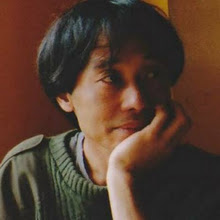At the end of 2011, we contacted all of our protagonists of RADIOACTIVISTS again, and asked them about their thoughts about the 3.11 incident in 2011, as well as their thoughts on possible developments in 2012. We want to publish their replies on our blog, and today we will start with the interview of YASUO AKAI, a Japanese translator and musician, who became active in the anti-nuclear movement as well as an author of the blog The First Person Pronoun to Wear. Read Akai-sans answers here:
 What changed for you this year?
What changed for you this year?Yasuo Akai: What this year left me may be a sense that anything can happen.
I wasn’t really interested in what was going on in Japan before 3.11, but, thanks to the nuclear disaster (and you!), I discovered that there’s such a thing as the Japanese protest culture.
What do you think about developments in Japan?
Yasuo Akai: It’s difficult to generalize. Various surveys conducted by the major news outlets appear to show that more than 70 percent of Japanese people want those nuclear power plants to be abandoned in the future. In other words, the idea that nuclear power plants are evil have penetrated across the political spectrum. I on a daily basis have opportunities to talk with ‘redneck’ conservative people who are basically xenophobic and LDP (the Liberal Democratic Party… a conservative party which had ruled post-war Japan until a couple of years ago) supporters or more right wing since I still have to keep my part time job at construction sites. One of the workers tells me that he believes that only the LDP can stop those nuclear power plants therefore that we should vote for this party. Of course I don’t subscribe to such a view, but ironically what he says is in a way true – only when conservatives move a country can move.
I watched YouTube footage of a TV show which introduced the life of Jinzabro Takagi, the nuclear scientist who founded the CNIC (Citizens Nuclear Information Center). In this show, a commentator said that “he was great because what motivated him to oppose the nuclear power was not an ideology.” My reaction was like, “that’s an ideology, stupid!” The mainstream media appear to try to depoliticize the people’s anti-nuclear sentiment. Depoliticization is indeed the ideology of this country. Having said that, of course before 3.11 no one could imagine that a major TV broadcaster could air such a show.
When it comes to the protest culture, for many protesters the problem is not just about the nuclear power plants. Since you left Japan, there has been this Occupy Wall Street movement. Your protagonists such as Hajime Matsumoto and Keisuke Narita, and also Masanori Oda, a.k.a. Illcommonz spent several days to camp at Zuccotti Park, just before the brutal eviction took place. There were solidarity actions in Japan, too, and I participated in one of those gatherings. I’ve also witnessed a few discussions at cafes so far. There might be numerous small groups tackling social problems and they might be increasing. What I’ve found at those discussions is that it is very difficult to formulate right questions and put them into plain language, therefore I believe there’s room for intellectuals to work with. Education is important.
What can happen in 2012?
Yasuo Akai: That’s hardly to tell, except for that chances are, the plight of those hundreds of thousands of victims will worsen – I say this since I know what was going on after the 1995 Kobe Earthquake.
When the reactors exploded, basically everyone lost legitimacy, so a lot of soul-searching will be going on – even conservatives have to realign themselves.
In order to let the government decide to abandon its nuclear policy, we need more of both militants and moderates. The latter is actually active – those conscientious engineers, scientists, and lobbyists (including members of the CNIC) are forming a network connecting citizens, industries, academics, and politicians, aiming at thinking of a better relationship between technology and people. This is understandable because, I can imagine, many engineers feel that ‘high-tech’ Japan has lost its credibility. I think the government will negotiate with them, but for this we need the former. And it pauses me a question – should I chain myself to the railway track? Should I hold dynamites, enter the Rokkasho facility and then threaten the officials, saying that if they don’t give up operations I’ll detonate the bombs? I cannot demand that the others do such things I cannot do on my own. What I can do is modest one – I think I can translate one’s thoughts into the others’ terms (this is not only about languages, those who speak the same language can speak in different terms) and thus can help communications. And that way I’ll definitely help those who take themselves to the streets.
